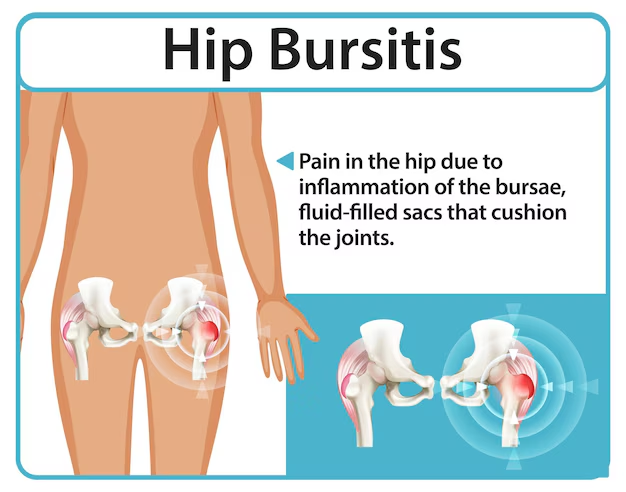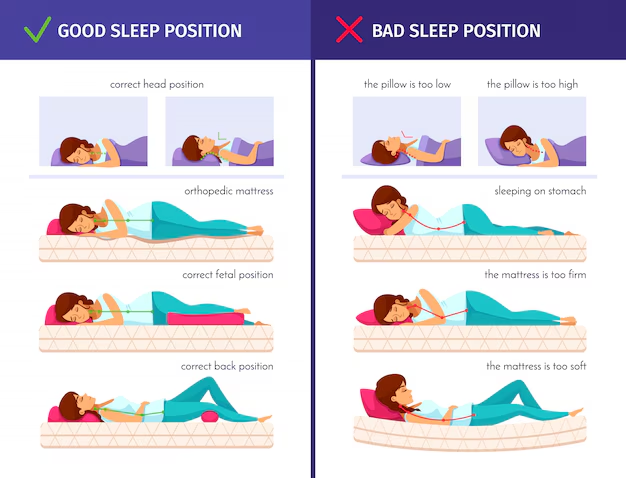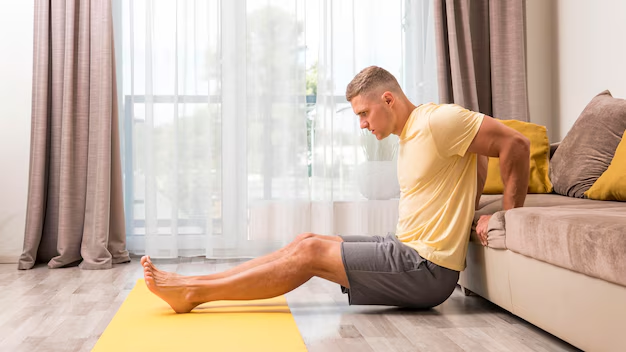Hip pain while sleeping can disrupt your rest and lower your quality of life. Understanding the causes and taking simple steps can help you sleep comfortably again. This blog explains the reasons for hip pain, tips for prevention, and effective solutions to reduce discomfort.
Causes of Hip Pain While Sleeping

- Sleeping Position
Your sleeping position can place pressure on the hips. Side sleepers often feel hip pain because the body weight concentrates on one side. - Arthritis
Osteoarthritis and rheumatoid arthritis can inflame the hip joints. Pain often worsens during inactivity, like sleeping. - Hip Bursitis
Hip bursitis occurs when the bursae, fluid-filled sacs around the joints, become inflamed. This inflammation causes sharp pain, especially when lying on the affected side. - Tendonitis
Tendonitis causes inflammation in the tendons around the hips. It usually results from repetitive movements, which stress the hip muscles. - Injuries or Overuse
Hip pain can result from injuries from falls, sports, or intense physical activity. Overuse of hip joints can also lead to soreness and inflammation. - Sciatica
Sciatica occurs when the sciatic nerve becomes compressed or irritated. Pain starts from the lower back and extends to the hips and legs, often worsening at night. - Hip Fractures
Fractures or small cracks in the hip bones may occur after trauma, especially in older adults. Fractures cause sharp, persistent pain that worsens during movement or when lying on the side. - Muscle Strains
Overexertion may cause strains in the hip flexors or gluteal muscles. These strains can cause pain that intensifies at night. - Pregnancy
Weight gain and hormonal changes during pregnancy can stress the hips and cause pain. Sleeping on the side can worsen the discomfort.
Common Symptoms of Hip Pain While Sleeping
- Sharp or aching pain in one or both hips
- Pain that worsens when lying on the side
- Stiffness or tenderness around the hip joint
- Pain that radiates down to the thigh or lower back
- Difficulty finding a comfortable sleeping position
- Disrupted sleep due to hip discomfort
How to Prevent Hip Pain While Sleeping
Change Your Sleeping Position
Sleep on your back instead of your side to reduce hip pressure. If you prefer side sleeping, place a pillow between your knees to align your hips.

- Use Supportive Pillows
A firm or orthopedic pillow under your lower back and hips can improve alignment. Proper support minimizes stress on the hip joints. - Choose the Right Mattress
A firm or medium-firm mattress supports your body better than a soft mattress. It prevents your hips from sinking, reducing pain. - Stretch Before Sleeping
Gentle hip stretches can loosen muscles and reduce stiffness. Stretching improves blood flow and relaxes the body before bed. - Maintain a Healthy Weight
Excess weight adds pressure to your hips. A healthy diet and regular exercise help relieve strain on the joints. - Strengthen Hip Muscles
Regular exercises like bridges, leg lifts, and gentle squats can build muscle support. Stronger hip muscles prevent pain during sleep. - Avoid High-Impact Activities Before Bed
Activities like running or jumping can strain your hip joints. To reduce pain, avoid these activities late in the evening.
Effective Solutions for Hip Pain While Sleeping
- Apply Heat or Cold Therapy
Use a heating pad or warm towel to relax hip muscles before bed. If inflammation causes pain, apply an ice pack for 15-20 minutes to reduce swelling. - Take Over-the-Counter Pain Relievers
Nonsteroidal anti-inflammatory drugs (NSAIDs) like ibuprofen can help manage pain. Always follow dosage instructions carefully. - Do Gentle Exercises
Regular low-impact exercises like swimming, walking, or yoga strengthen hip muscles. Stronger muscles provide better joint support. - Physical Therapy
A physical therapist can create personalized exercises to relieve hip pain. Therapy improves strength, flexibility, and posture. - Try Hijama Therapy
Hijama therapy, or cupping therapy, promotes blood circulation and reduces inflammation. This natural treatment may ease hip pain, helping you sleep better. - Adjust Your Mattress or Bed
If your mattress causes discomfort, consider using a mattress topper. Memory foam toppers provide better pressure relief for hips. - Massage Therapy
Regular massages help relax tight hip muscles. Gentle massage increases blood flow and reduces stiffness. - Supportive Footwear During the Day
Proper shoes with arch support align your body during the day. Good posture reduces pressure on the hips at night. - Consult a Doctor
Persistent hip pain may indicate a more serious issue. If pain does not improve with home care, consult a healthcare professional for diagnosis and treatment.
Stretches to Relieve Hip Pain Before Bed

- Knee-to-Chest Stretch
- Lie on your back. Bring one knee to your chest. Hold for 20-30 seconds.
- Figure-Four Stretch
- Lie on your back. Cross one ankle over the opposite knee. Pull the uncrossed leg toward your chest.
- Hip Flexor Stretch
- Kneel on one knee. Step the other foot forward, keeping your back straight. Lean slightly forward to stretch the hip.
- Butterfly Stretch
- Sit on the floor with your feet together. Press your knees toward the floor gently.
- Child’s Pose
- Kneel on the floor. Sit back on your heels, stretch your arms forward, and relax your hips.
Final Thoughts
Hip pain while sleeping affects many people, but simple changes can make a big difference. Understand the causes, recognize symptoms, and use effective solutions to enjoy pain-free sleep. Try stretching, using proper support, or seeking professional treatments for lasting relief. If pain persists, consult a doctor to address the problem early.
